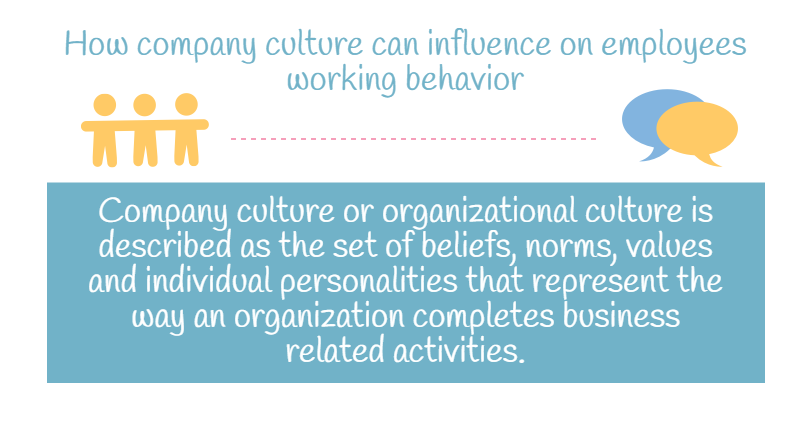Company culture or organizational culture is described as the set of beliefs, norms, values, and individual personalities that represent the way an organization completes business-related activities.
The set of “beliefs and values” is different for every company. Some cultures may welcome a casual attitude and an open, easy working atmosphere, while others may stick to the more classical, strict style of doing things.
The “norms” refer to some kind of traditions or unspoken rules that the whole company follows. It can be anything from complete honesty to precise punctuality or something simpler like sharing food with your peers. This is the “we run things in the way we see fit here” concept and every new employee has no choice but to adapt. Whether that particular way of things suit the person, is another matter.
What‘s important to understand is that no culture is wrong or right, as long as it doesn‘t hinder development or negatively impact on work quality. The thing is that different employees perform differently in different situations. Depending on the person, he or she might do absolutely great or fail miserably when it comes to working in a specific atmosphere.
That being said, a company‘s culture isn‘t stationary: it keeps evolving with every new experience, every new personality (which is strong enough to influence it) and every new project. Moreover, managers and seniors should continuously strive to improve the culture for the better (and “the better” can be understood as “the way that will help get more done in less time).
Employees work together to achieve certain goals. As the goals become more specific, organizations often undertake their own, unique road, which can lead to both success and failure. The choice of the road is highly influenced by the individuals that work together and the overall atmosphere around the place.

While any organization is free to run the business as it sees fit, there are two important aspects that can help positively impact employee behavior.
Honest Performance appraisal
When you praise somebody for a job well done, it can mean a lot more than that. People are social creatures and by default, every person is hungry for attention, more so, if it‘s positive attention. Hearing just a simple line like “thank you, you did an awesome job!” can go a long way in terms of motivation and productivity for that particular employee.
Receiving praise isn‘t just about the job. It‘s about being heard and getting the treatment they think they deserve. It boosts their self-satisfaction and states the hunger for attention for a while until the dose wears off and they need more.
An important part here is that the praise should be honest. Almost all people can smell false praise from miles away, and receiving false praise won‘t have any positive effect. In fact, it might mean one of the following:
- You are stupid and can‘t even tell the difference between a job well done and something that is expected to be done. Minus a few authority points for you there.
- You are being sarcastic. Your team member might even feel bad after receiving false praise and interpreting it this way.
A very common downside here can be the fact that some people become overconfident when they receive too much praise. It leads them to think that they excel at whatever they do and therefore, they stop trying to do improve their performance altogether. Be careful not to let that happen.
Training and development
Education is one of the cornerstones of a successful career for any person nowadays. With the numerous technological innovations and advancements that happen on a monthly basis, there is always something new to learn, something more to know. In fact, this has become so important, that people consider training and development to be of higher importance than their annual salary.
A culture that promotes and encourages training and development (and invests a proper amount of resources into it) is like a dream come true for the majority. Moreover, it‘s also important for managers: the better your team is at what it does, the better results you will be able to deliver together.
Strong culture advantages
A strong corporate culture is composed of like-minded people that hold similar values and beliefs. Aligning those values and beliefs with your objectives can help build trust, improve productivity, and increase motivation toward the job. Again, it doesn‘t matter whether these like-minded people are conservative or open-minded: what matters is that it needs to work and produce results.
Cultural effects on performance
Everything said above is variable and can work (or not work) in different scenarios for different cases. However, there is one thing that is certain: employees enjoy their work and perform better if they feel that they are a part of the corporate culture.
This goes back to people being social creatures. No matter how introverted a person may be, he or she still needs to feel like a part of something bigger, something that is worth wasting 40+ hours on every week. This feeling also adds another piece to the puzzle: people need to see a purpose to really start putting in the sweat and tears needed to create something remarkably great. Being a part of the culture that they love is a damn good purpose, to begin with.



